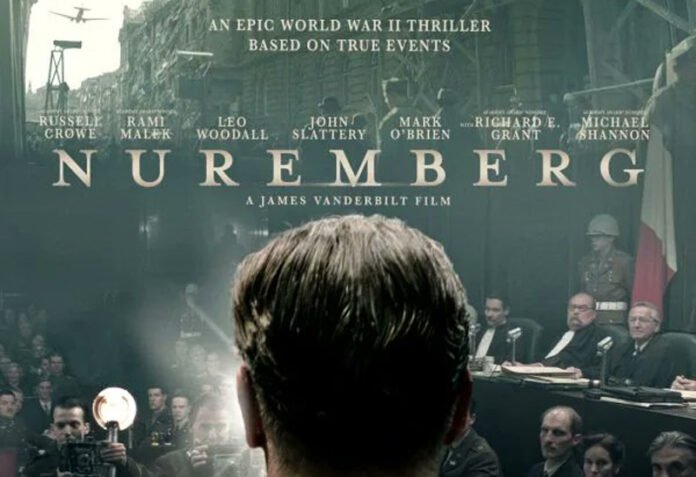Film Review:
“Justice is never clean—it’s dissected.”
That’s the opening line that defines Nuremberg (2025), a stunningly taut courtroom drama that transforms post-war prosecution into a psychological duel. Directed with icy precision by Edward Berger (All Quiet on the Western Front), the film swaps moral grandstanding for mind games—and Rami Malek delivers one of his most haunting, cerebral performances yet.
Playing Lt. Col. Dan Abrams, an American military lawyer obsessed with unmasking the architecture of evil, Malek commands every frame. His quiet rage and detached intellect draw chilling parallels to the interrogations of Tinker Tailor Soldier Spy and the moral reckoning of Damages. You don’t just watch him—he studies you.
A Trial Turned Battlefield
Set against the grandeur of post-war Germany, Nuremberg unfolds inside ornate halls and smoke-filled chambers where justice feels as fragile as the glass windows trembling in winter wind. Berger keeps the tone subdued, replacing spectacle with tension. Every witness testimony feels like a duel, every silence like a confession.
While it deals with the historical Nuremberg trials, this is no history lesson—it’s a psychological siege. Malek’s interactions with the Nazi defendants (played with unnerving calm by Ulrich Matthes and Daniel Brühl) expose not just the machinery of genocide, but the moral erosion of those seeking justice.
Performance & Direction
Malek is extraordinary—methodical, calculating, and brittle. There’s an undercurrent of trauma in every pause. Critics have already hailed his turn as “a cold-blooded genius” and “Oscar-grade minimalism.”
Berger’s camera rarely blinks. He builds the tension like a ticking clock—tight framing, long silences, and the occasional flicker of humanity breaking through the fog of reason. The cinematography, all steel blues and ashen grays, mirrors the guilt and ambiguity of post-war Europe.
The supporting cast impresses—Léa Seydoux as a translator with secrets, Michael Shannon as the American general torn between politics and conscience. Together, they turn procedural dialogue into emotional shrapnel.
Verdict: Damages Meets History
Nuremberg isn’t about verdicts—it’s about moral corrosion. It channels the intellectual suspense of Damages and The Night Of, blending historical realism with psychological warfare. Some may find its pacing deliberate, but that’s precisely its menace. You don’t sprint through history—you endure it.
By the end, as Malek’s voice cracks during a final cross-examination, you realize: this isn’t just a film about justice. It’s about what happens when reason meets horror—and both lose.
⭐ Ratings Summary:
Performances: ★★★★★
Screenplay: ★★★★☆
Direction: ★★★★★
Cinematography: ★★★★☆
Emotional Impact: ★★★★☆
Final Verdict: Nuremberg (2025) is an unflinching, cerebral masterpiece—a courtroom thriller that burns slowly and cuts deep, led by Rami Malek’s cold, commanding brilliance.
















